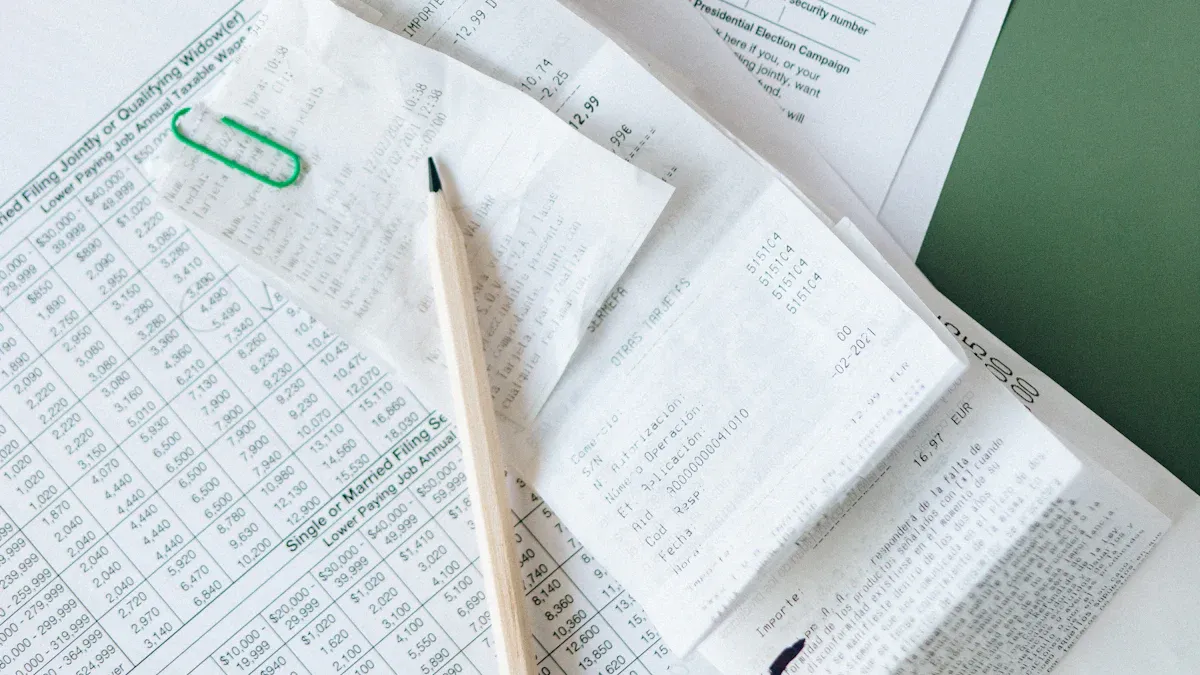- EasyCard
- Trade
- Help
- Announcement
- Academy
- SWIFT Code
- Iban Number
- Referral
- Customer Service
- Blog
- Creator
Taxes on Hong Kong Stock Trading Profits and How to Comply in Practice

Image Source: pexels
Common taxes for Hong Kong stock trading include stamp duty, personal income tax, and capital gains tax. Chinese individuals investing in Hong Kong stocks through Stock Connect (Shanghai-Hong Kong or Shenzhen-Hong Kong) are temporarily exempt from personal income tax on capital gains until the end of 2027. Profits from direct Hong Kong stock accounts must be declared for personal income tax at a 20% tax rate. Mainland companies investing in Hong Kong stocks are subject to corporate income tax and value-added tax. Hong Kong companies only need to pay stamp duty, with capital gains tax generally not applicable. Tax authorities are strengthening oversight, and investors need to focus on compliant filing and tax risks.
Key Points
- Hong Kong stock trading primarily involves stamp duty, personal income tax, and capital gains tax, with tax policies varying by investment channel.
- Investing through Shanghai-Hong Kong or Shenzhen-Hong Kong Stock Connect is temporarily exempt from personal income tax on capital gains, but dividends are subject to 20% personal income tax.
- Trading through direct accounts with Hong Kong brokers requires declaring personal income tax at a 20% rate, with risks of back taxes and late fees for non-compliance.
- Mainland companies investing in Hong Kong stocks must pay corporate income tax and stamp duty, and fund flows must be compliant to avoid tax penalties.
- Hong Kong companies trading Hong Kong stocks need to pay stamp duty and profits tax but enjoy exemptions from capital gains tax and certain tax incentives.
Hong Kong Stock Trading Taxes

Image Source: pexels
Stamp Duty
Stamp duty is one of the most common taxes in Hong Kong stock trading. Investors need to pay stamp duty based on the transaction amount when buying or selling Hong Kong stocks.
- The stamp duty rate is 0.1% of the transaction amount, calculated in US dollars (USD) and converted at the current exchange rate (1 USD ≈ 7.8 HKD).
- Stamp duty is charged bilaterally, with both the buyer and seller paying. For transactions under one dollar, it is calculated as one dollar.
- Trading of Stock Connect ETFs and Stock Connect equity warrants is temporarily exempt from stamp duty.
- The latest stamp duty rate remains 0.1%.
Investors must pay stamp duty regardless of whether they trade through Shanghai-Hong Kong Stock Connect, Shenzhen-Hong Kong Stock Connect, or direct accounts with Hong Kong brokers. Stamp duty is a fixed cost in the trading process and cannot be avoided.
Personal Income Tax
Personal income tax mainly applies to capital gains and dividends from Hong Kong stock trading. Chinese individual investors trading through Shanghai-Hong Kong or Shenzhen-Hong Kong Stock Connect are temporarily exempt from personal income tax on capital gains, with the policy effective until the end of 2027.
However, if investors trade through direct accounts with Hong Kong brokers, they must declare and pay personal income tax at a 20% rate. Tax authorities require investors to accurately report Hong Kong stock trading income, or they face risks of back taxes and late fees.
Additionally, dividends received by Stock Connect investors are subject to a 20% personal income tax withheld by China Securities Depository and Clearing Corporation (CSDC). For some H-shares, a 10% income tax is pre-withheld before dividend distribution, and Stock Connect channels impose an additional 20%, resulting in a high effective tax burden. Chinese regulators are exploring ways to optimize dividend tax policies to reduce the burden on investors.
Tip: Investors should pay attention to the personal income tax filing process, stay updated on policy changes, and avoid tax risks due to negligence.
Capital Gains Tax
Capital gains tax applies to profits from the price difference in buying and selling stocks. Hong Kong and China have significant differences in capital gains tax policies. The table below compares the main tax policies in both regions:
| Tax/Policy | Hong Kong | China |
|---|---|---|
| Capital Gains Tax | Exempt from capital gains tax; profits from stock price fluctuations are tax-free | Subject to relevant capital gains tax, with stricter policies |
| Dividend Tax | For direct investments through Hong Kong accounts, dividends are generally exempt; H-shares incur 10% personal income tax | Chinese investors via Stock Connect pay 20% personal income tax on dividends, facing double taxation issues |
| Trading Stamp Duty | 0.1%, bilateral (reduced in November 2023) | A-share stamp duty 0.05%, unilateral |
| Other Transaction Fees | Includes trading commission, transaction levy (0.027‰), trading fee (0.05‰), system usage fee (HK$0.5 per transaction), settlement fee (0.02‰) | Fees vary by broker and exchange, generally higher |
| Tax Policy Features | Low tax rates, no VAT or business tax, offshore profits may be exempt | Strict tax policies, capital market gains are taxable |
Investors trading through Shanghai-Hong Kong or Shenzhen-Hong Kong Stock Connect are temporarily exempt from personal income tax on capital gains. Trading through direct Hong Kong broker accounts requires lawful declaration and payment of capital gains tax. Investors should plan tax filings based on their identity and investment channel to reduce tax risks.
Mainland Individual Taxes
Shanghai-Hong Kong/Shenzhen-Hong Kong Stock Connect
When Chinese individuals invest in Hong Kong stocks through Shanghai-Hong Kong or Shenzhen-Hong Kong Stock Connect, capital gains are temporarily exempt from personal income tax. Dividends received are subject to a 20% personal income tax withheld by CSDC. Investors do not need to file independently, as the withholding process is handled uniformly by CSDC. Currently, Stock Connect investments do not benefit from the China-Hong Kong tax treaty, so investors cannot enjoy dividend tax exemptions. This results in reduced actual dividend receipts but simplifies the filing process.
Direct Hong Kong Stock Accounts
If Chinese individuals trade through direct accounts with Hong Kong brokers, all profits from Hong Kong stock trading are considered overseas income. According to relevant policies, stock trading profits are classified as property transfer income, subject to a 20% tax rate per transaction. Investors must actively declare and pay personal income tax to the tax authorities after earning profits. The filing process involves completing an overseas income declaration form, uploading relevant transaction documents, and paying taxes within the specified period. Tax authorities have intensified audits of overseas investment income in recent years. Individuals who fail to declare or under-declare will be required to pay back taxes and late fees. Late fees accrue at 0.05% per day from the payment deadline, typically covering undeclared income from the past three years, with longer periods in special cases.
Dividend Tax
Dividends received by Hong Kong stock investors through Stock Connect are subject to a 20% personal income tax withheld by CSDC. Investors do not need to file independently, making the process efficient and convenient. Dividends from direct Hong Kong broker accounts also require a 20% personal income tax declaration. Tax authorities notify taxpayers to correct under-reported or unreported overseas income via phone, SMS, or apps. Investors should promptly address under-reporting or omissions to avoid penalties like back taxes and late fees. Compliant filing not only avoids tax risks but also helps maintain personal credit.
Mainland Company Taxes
Tax Types and Filing
When Chinese companies invest in Hong Kong stocks, they primarily face corporate income tax and stamp duty. Corporate income tax applies to capital gains from Hong Kong stock trading, with a tax rate of 25%. Companies must also pay stamp duty at 0.1% of the transaction amount. Companies should declare and pay relevant taxes to the tax authorities promptly after earning profits from Hong Kong stock trading. The filing process includes preparing transaction documents, completing corporate income tax declaration forms, and paying taxes within the specified period. Failure to file on time will result in back tax demands and late fees. Companies must also address dividend income taxation as per regulations. Proper tax filing planning helps reduce tax risks.
Fund Flows
Compliance in fund flows is critical when Chinese companies invest in Hong Kong stocks cross-border. Companies must complete export customs declarations in their own name to ensure authentic export records in the customs system. Compliant export customs declarations are the foundation for legitimate fund repatriation. Using irregular methods like “buying bills” for exports will trigger strict scrutiny from tax authorities, potentially leading to penalties. Receiving funds through personal accounts carries significant risks, as tax authorities use smart monitoring systems to strengthen oversight. Personal account receipts often lead to discrepancies between internal and external accounts, lacking original documents, and may be deemed fraudulent transactions, requiring payment of value-added tax, corporate income tax, personal income tax, fines, and late fees. The issue of “inconsistent three flows” (contract information flow, fund flow, and goods flow) is prominent, as mismatches may disqualify companies from export tax rebates, increase tax burdens, and even lead to tax evasion charges. Companies should standardize customs declaration processes, fulfill tax obligations correctly, and ensure safe and compliant fund repatriation.
Hong Kong Company Hong Kong Stock Trading
Stamp Duty Policy
Hong Kong companies must pay stamp duty when trading Hong Kong stocks. The stamp duty rate is 0.13% of the transaction amount, borne by both the buyer and seller. Whether trading through local Hong Kong brokers or Stock Connect, companies must pay stamp duty at this rate. Based on the current exchange rate (1 USD ≈ 7.8 HKD), investors can calculate the tax amount based on the actual transaction value. Stamp duty is a fixed cost in the trading process and cannot be exempted. Compared to China’s A-share market, Hong Kong’s stamp duty rate is lower, and the collection method is simpler.
Profits Tax
Profits earned by Hong Kong companies from Hong Kong stock trading are generally subject to profits tax. Hong Kong adopts a territorial source principle, taxing only income derived from Hong Kong. The standard profits tax rate is 16.5%. If a company’s annual turnover does not exceed HK$2 million (approximately $256,000), it can enjoy a preferential tax rate of 8.25%. Profits from direct stock trading on the Hong Kong Stock Exchange are considered taxable income. Dividend income from holding shares in other companies is generally exempt from profits tax. Companies must file profits tax returns on time, even if there are no profits or in a zero-declaration state.
Tax Incentives
Hong Kong companies enjoy several tax incentives. First, Hong Kong does not levy capital gains tax, so profits from stock price differences in Hong Kong stock trading are tax-free. Second, some small companies can benefit from a lower profits tax rate. The company registration process is straightforward, including name checks, submission of registration documents, government review and certification, seal production, opening a Hong Kong bank account, and applying for tax registration. The registration process typically takes 3-5 business days. After establishment, companies need to arrange accounting and audit services, submit annual reports, and update director and shareholder information. To apply for tax exemptions, companies must provide business descriptions and audit reports. Hong Kong tax authorities require all companies to file taxes on time to ensure compliant operations.
Tip: Hong Kong companies trading Hong Kong stocks should focus on stamp duty and profits tax filings, leveraging tax incentives to ensure tax compliance.
Compliance and Risks

Image Source: pexels
Filing Process
After earning profits from Hong Kong stock trading, investors must declare overseas income to the tax authorities during the annual filing window from March 1 to June 30. The filing process includes:
- Logging into the personal income tax app or tax website and completing the overseas income declaration form.
- Uploading relevant Hong Kong stock trading documents, such as transaction records and settlement statements.
- Calculating the tax payable at a 20% rate and completing online tax payment.
Tax authorities provide online filing channels to simplify the process. Investors should proactively organize documents to avoid delays due to incomplete materials.
CRS and Audits
Since the implementation of the CRS mechanism in 2018, China has exchanged financial account information with over 100 countries and regions, expanding to over 150 jurisdictions by 2025. Tax authorities use the CRS mechanism to obtain overseas financial account information, combined with the Golden Tax Phase IV system and AI analytics, to monitor dividends, capital gains, and other income from Hong Kong stock trading.
Tax authorities focus on high-net-worth individuals, high-frequency trading accounts, and listed company shareholders. For non-declared or fraudulent filings, tax authorities employ a five-step approach: reminders, urging compliance, interviews, audits, and public exposure. Failure to declare as required will result in back taxes and late fees, with amounts ranging from tens of thousands to millions of dollars.
Optimization Suggestions
Investors should proactively self-audit and file, cooperate with tax authorities, and organize all Hong Kong stock trading documents. It’s recommended to file reasonably using the annual profit-and-loss offset principle and consult tax authorities promptly for questions. Some investors choose to trade through Stock Connect to leverage the capital gains tax exemption and reduce back tax risks, though they must weigh restrictions like inability to participate in IPOs.
Leveraging tax incentives and choosing appropriate investment channels can help reduce tax risks and ensure asset safety.
Investors and companies trading Hong Kong stocks must focus on tax compliance. Hong Kong taxes only local profits, with offshore profits potentially exempt and capital gains from equity transfers tax-free. China temporarily exempts capital gains tax for Stock Connect investments, but direct trading through Hong Kong broker accounts requires declaration and taxation. Tax authorities use CRS and big data to strengthen oversight, with undeclared income subject to back taxes and late fees. Investors are advised to choose appropriate investment channels, leverage tax incentives, file on time, and avoid financial losses due to negligence.
FAQ
How Is Stamp Duty for Hong Kong Stock Trading Calculated?
Investors must pay stamp duty at 0.13% of the transaction amount when buying or selling Hong Kong stocks. Both buyer and seller bear the cost. At 1 USD ≈ 7.8 HKD, the actual tax amount can be calculated accordingly.
What Taxes Apply to Hong Kong Stock Investments via Stock Connect?
Investors trading through Stock Connect are temporarily exempt from personal income tax on capital gains. Dividends are subject to a 20% personal income tax withheld by CSDC. Stamp duty still applies.
How to Declare Taxes for Trading Hong Kong Stocks via Direct Broker Accounts?
Investors earning profits through Hong Kong broker accounts must declare personal income tax at a 20% rate. Filing should be completed via the personal income tax app or tax website during the annual filing period.
Do Hong Kong Companies Need to Pay Taxes on Hong Kong Stock Trading Profits?
Hong Kong companies must pay profits tax on Hong Kong stock trading profits at a 16.5% rate. If annual turnover is below HK$2 million (~$256,000), a preferential 8.25% rate applies.
What Are the Consequences of Not Declaring Hong Kong Stock Trading Income?
Tax authorities will demand back taxes and impose late fees, calculated at 0.05% per day. Long-term non-declaration may also impact personal credit records.
After understanding the tax details of Hong Kong stock trading, it’s clear that compliance is crucial, but complex declaration processes and potential tax risks remain a major pain point for investors. Whether you trade through Stock Connect or directly with a Hong Kong broker, you may face multiple taxes and opaque fund flow issues. BiyaPay was created to solve these challenges, offering a more comprehensive and efficient cross-border financial solution. We support the conversion between various fiat and digital currencies, allowing you to invest in both U.S. and Hong Kong stocks on one platform without a complex overseas bank account, easily achieving asset diversification. With our real-time exchange rate query feature, you can always seize the optimal conversion opportunities and ensure every transaction is worthwhile with a remittance fee as low as 0.5%. Say goodbye to cumbersome processes and non-transparent fees, and register with BiyaPay today to begin your new era of smart investing.
*This article is provided for general information purposes and does not constitute legal, tax or other professional advice from BiyaPay or its subsidiaries and its affiliates, and it is not intended as a substitute for obtaining advice from a financial advisor or any other professional.
We make no representations, warranties or warranties, express or implied, as to the accuracy, completeness or timeliness of the contents of this publication.




Contact Us
Company and Team
BiyaPay Products
Customer Services
is a broker-dealer registered with the U.S. Securities and Exchange Commission (SEC) (No.: 802-127417), member of the Financial Industry Regulatory Authority (FINRA) (CRD: 325027), member of the Securities Investor Protection Corporation (SIPC), and regulated by FINRA and SEC.
registered with the US Financial Crimes Enforcement Network (FinCEN), as a Money Services Business (MSB), registration number: 31000218637349, and regulated by FinCEN.
registered as Financial Service Provider (FSP number: FSP1007221) in New Zealand, and is a member of the Financial Dispute Resolution Scheme, a New Zealand independent dispute resolution service provider.




















